SHOULDER PAIN
SHOULDER PAIN
“I didn’t realise that Chiropractors treat shoulder pain” …. people often think of Chiropractors only treating sore backs and necks and not other joints. Chiropractors treat all the joints of the body. Some Chiropractors specialise in treating peripheral joint injuries such as shoulders and knees whilst others specialise in specific treatment types that can be very helpful in treating extremity injuries such as shoulder injuries.
SHOULDER INJURIES
At Peverell Chiropractic Clinic, Chiropractor Kevin Kelly has a vast experience in treating shoulder injuries and his particular area of interest the Myofascial Correction® technique he has developed incorporates Instrument Assisted Soft Tissue Mobilisation (IASTM), Kinesiotaping and Myofascial release, all of which are particularly useful for all types of shoulder, Sports and extremity injuries.
The extreme mobility present in the shoulder joint is due to several joints that function together smoothly forming the shoulder joint complex. This complex includes the sternoclavicular joint, the acromioclavicular joint, the glenohumeral (ball and socket joint), and a pseudo-joint often termed the scapulothoracic articulation. The ball and socket joint has a very shallow socket, it is this factor which makes the shoulder so flexible with it’s great range of motion but also makes it more prone to injury than some other joints.
As the shoulder ball and socket joint is very shallow, it is the surrounding muscles, tendons and ligaments that support the joint. Strains to these muscles and tissues can cause pain, injury and greatly reduced motion in the shoulder joint.
Being able to mobilise and adjust the different joint complexes of the shoulder and upper, back and neck as well as using massage and soft tissue therapy enables a very effective treatment for shoulder injuries. Chiropractic for shoulder pain is certainly a sensible option.


ROTATOR CUFF INJURY
A very common shoulder injury is a Rotator cuff injury. The rotator cuff consists of four muscles in total and these are the primary support and stabilising structure for the shoulder joint. Therefore, even just a minor injury such as a strain to one of these muscles may trigger a lot of pain. Injuries to the rotator cuff muscles may also cause arm weakness, and decreased athletic performance. More severe rotator cuff injuries may irritate the many nerves that pass through the shoulder joint structures, this is called a Rotator Cuff Impingement, and this may cause arm pain and tingling and or numbness in the arm and hand. With a rotator cuff injury pain causing disuse of the arm may eventually cause an adhesive capsulitis of the shoulder joint (see below).
FROZEN SHOULDER
Adhesive capsulitis (Frozen shoulder) is a condition that causes a contraction and inflammation of the joint capsule the protective capsule that surrounds every joint, this is a watertight sac that bathes the joint in synovial fluid, keeping it lubricated, chronic inflammation of the capsule can lead to the accumulation of scar-tissue within and around the joint this scar tissue can cause adhesions which “stick” this capsule to surrounding tissues.
The capsule also contracts limiting joint movement. Adhesive capsulitis can affect almost any joint in the body. However, the commonest joint it affects is the shoulder, if severe this is commonly termed a “Frozen Shoulder”
